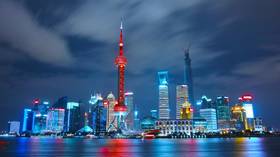The West considers China anti-business. But the money tells a different story

The West’s politicians and media like to peddle the idea that China under Xi Jinping is anti-business, slowing down and heading for a crisis. But follow the money that savvy investors are pouring in, and you see the reality.
It might be surprising to hear that, despite everything which has happened this year, including geopolitical tensions between the US and China, talk of potential war and the increasingly abysmal picture that the media has painted of China’s economy, the country is for the second consecutive year on course to be the world's highest recipient of foreign direct investment (FDI). Well, at least according to the Global Times, anyway, which states FDI into China for the year of 2021 has amounted to $160 billion. The statistic is credible, being around that of the previous year, when it received about $30 billion more than America.
At the time, it appeared that China’s achievement in 2020 was a blip, given it came in the extraordinary circumstances of it being an economy back on its feet from Covid, while the US’s was not. However, this new data appears to show that even with the recovery of the US economy, Washington has not won back its former crown.
Yet if one only read what mainstream Western media outlets say, it seems hard to believe, not least because they’ve been relentlessly pessimistic about China’s economy, with op-eds arguing that it is no longer an attractive destination for foreign investment, that growth is being upended by its zero-Covid policy, a commodity crisis, real-estate bubbles and Xi Jinping's widely publicized crackdown on Big Tech too, which did hit stocks such as Alibaba’s and Tencent’s hard. So, despite all that, Beijing still comes out on top for investment?
It may be hard to believe for some ears, and that itself is the problem. The reality, as depicted by Western media, is comically and often hysterically distorted and riddled with ideological and geopolitical biases which are obsessed with affirming China’s inevitable, impending failure. Instead, such statistics may mark the permanent turning of an inevitable tide, one which the US is desperate not to happen, but is happening anyway.
It’s an uncomfortable scenario for Washington, but it is the reality: as a rapidly ascendant, larger market, China will logically become a bigger hub of investment and capital than the United States. Most American investors agree with this and have skin in the game, and this tells us a much bigger story about why the US is reacting the way it is in relation to the rise of China, and is determined to clutch at straws to try to prevent it from happening.
Also on rt.com Why do some American Sinophobes seem to want a US-China war, and are doing their damndest to set one up?The centre of global economic gravity is shifting from west to east. A great deal of the story has already been told. China has emerged from a poor agrarian nation into an industrial giant which boasts the world's second largest GDP, its largest population and fastest-growing consumer market. China already is the biggest trading nation in the world, dominating both global exports and imports respectively. It is, by per-capita income, a middle-ranking country presently, with an estimated average income per person of $10,500. It still trails some way behind the developed world, but it has not yet reached the pinnacle of its development.
Some question just how much further China can grow further and frequently talk about a “slowdown” (though this is only a slowdown in its rather rapid rate of growth, not a contraction of the economy), while others believe it will likely surpass the nominal size of the United States in the next decade or so.
Either way, it should not be overlooked that in the eyes of business and investors, the size and potential of China remains huge, and promises gains that are not available in America or elsewhere. Geopolitical bumps in the road are not putting off investors, no matter how much some hope they do.
The United States has always been viewed as the business and economic capital of the world and, in many aspects, it still is, primarily because it has never had a serious competitor for so long. But now it does, and when one looks at its market size and its growth potential, it stands smaller than China, which has not yet reached its peak.
Yet the very notion of this has become controversial in political and media circles, and those sections of the Western public who have bought into the propagandized messaging. The idea that China could displace the United States, a country that believes it is destined to continue to dominate and lead the world, causes considerable anxiety and leads to a desire to hammer home a message that people shouldn’t do business with China anymore, that it is risky, unsafe, or immoral.
Over the past year or so, there have been relentless numbers of op-eds and articles attempting to push nothing but abject negativity and foaming-at-the-mouth pessimism regarding China, advocating that supply chains should be brought back home because they are unreliable, that you should stop investing there as it’s not attractive for businesses anymore, and so on. Every single development and crisis is blown infinitely out of proportion to be the death-knell of the Communist Party and China’s economy, focusing on rhetoric, not facts.
Also on rt.com China’s bid to join digital trade pact is another example of how it is consistently outflanking the USWhen the country’s GDP growth slowed down in the third quarter of this year, the media set off the alarm bells, yet when US GDP in the same quarter slowed down by an even larger margin, the press shrugged it off saying things would “rebound.” Never at any time has a message been so out of touch with reality. This reporting process is known as “wishcasting,” the hope that in pushing a preferred angle so many times it will eventually come true, even if it contravenes the facts. The US doesn’t want China under the current status quo to succeed, but it is and that’s the problem.
Investors around the world by and large shrug off this narrative, see the reality, and are happy to vote with their money. And even as the United Kingdom sends aircraft carriers around China’s periphery, the FTSE London stock exchange is doubling down on its stakes in China, adding Chinese bonds to its indices and projecting to even double the number of Chinese firms on its indexes. While Xi’s actions have created some turbulence in tech, China’s market is a lot more than just one sector, and there is plenty to sell and plenty to get into, and action speaks louder than words.
As the US preaches cold war and geopolitical confrontation, it is paradoxically ultimately demanding more access to China’s markets, not less (albeit with the goal of politically dominating them to its own benefit, not China’s). This all pushes past the mirage that China is a country apparently turning “inwards” under Xi, who is apparently scaring away investors and creating a Communist dystopia that hates private businesses. Far from it. Yes, Xi has demanded a more equal society, but this is in line with what China needs on a socio-economic basis to continue growing, which is naturally not always what unlimited capitalism would like.
On this issue, the numbers speak for themselves. China was the highest destination for FDI in 2020, and is on course to remain so in 2021 as well. The reality is clear, the ‘China opportunity’ calculus of investors remains, much to the disdain of Washington DC and others who naively wish that Beijing could be put in a box, isolated and treated like another Soviet Union. The competition between the two is heating up, but the economic shift from the US to China is real and Washington faces a stark choice of either embracing it, or isolating themselves from it in the long run.
Like this story? Share it with a friend!
The statements, views and opinions expressed in this column are solely those of the author and do not necessarily represent those of RT.














